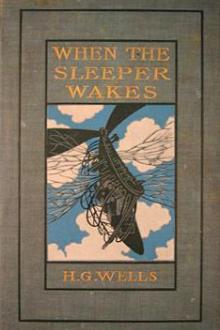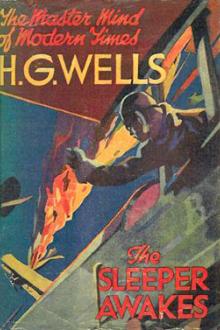When the Sleeper Wakes by H. G. Wells (tharntype novel english txt) 📕

- Author: H. G. Wells
- Performer: -
Book online «When the Sleeper Wakes by H. G. Wells (tharntype novel english txt) 📕». Author H. G. Wells
He did not clearly understand that he had struck the side float of the aeroplane and slipped off, but he perceived that he was flying free on the down glide and rapidly nearing earth. What had he done? His heart throbbed like a noisy engine in his throat and for a perilous instant he could not move his levers because of the paralysis of his hands. He wrenched the levers to throw his engine back, fought for two seconds against the weight of it, felt himself righting driving horizontally, set the engine beating again.
He looked upward and saw two aeroplanes glide shouting far overhead, looked back, and saw the main body of the fleet opening out and rushing upward and . . outward; saw the one he had struck fall edgewise on and strike like a gigantic knife-blade along the windwheels below it.
He put down his stern and looked again. He drove up heedless of his direction as he watched. He saw the windvanes give, saw the huge fabric strike the earth, saw its downward vans crumple with the weight of its descent, and then the whole mass turned over and smashed, upside down, upon the sloping wheels. Throb, throb, throb, pause. Suddenly from the heaving wreckage a thin tongue of white fire licked up towards the zenith. And then he was aware of a huge mass flying through the air towards him, and turned upwards just in time to escape the charge — if it was a charge — of a second aeroplane. It whirled by below, sucked him down a fathom, and nearly turned him over in the gust of its close passage.
He became aware of three others rushing towards him, aware of the urgent necessity of beating above them. Aeroplanes were all about him, circling wildly to avoid him, as it seemed. They drove past him, above, below, eastward and westward. Far away to the westward was the sound of a collision, and two falling flares. Far away to the southward a second squadron was coming. Steadily he beat upward. Presently all the aeroplanes were below him, but for a moment he doubted the height he had of them, and did not swoop again. And then he came down upon a second victim and all its load of soldiers saw him coming. The big machine heeled and swayed as the fear maddened men scrambled to the stern for their weapons. A score of bullets sung through the air, and there flashed a star in the thick glass wind-screen that protected him. The aeroplane slowed and dropped to foil his stroke, and dropped too low. Just in time he saw the windwheels of Bromley hill rushing up towards him, and spun about and up as the aeroplane he had chased crashed among them. All its voices wove into a felt of yelling. The great fabric seemed to be standing on end for a second among the heeling and splintering vans, and then it flew to pieces. Huge splinters came flying through the air, its engines burst like shells. A hot rush of flame shot overhead into the darkling sky.
“Two!” he cried, with a bomb from overhead bursting as it fell, and forthwith he was beating up again. A glorious exhilaration possessed him now, a giant activity. His troubles about humanity, about his inadequacy, were gone for ever. He was a man in battle rejoicing in his power. Aeroplanes seemed radiating from him in every direction, intent only upon avoiding him, the yelling of their packed passengers came in short gusts as they swept by. He chose his third quarry, struck hastily and did but turn it on edge. It escaped him, to smash against the tall cliff of London wall. Flying from that impact he skimmed the darkling ground so nearly he could see a frightened rabbit bolting up a slope. He jerked up steeply, and found himself driving over south London with the air about him vacant. To the right of him a wild riot of signal rockets from the Ostrogites banged tumultuously in the sky. To the south the wreckage of half a dozen air ships flamed, and east and west and north the air ships fled before him. They drove away to the east and north, and went about in the south, for they could not pause in the air. In their present confusion any attempt at evolution would have meant disastrous collisions. He could scarcely realize the thing he had done. In every quarter aeroplanes were receding. They were receding. They dwindled smaller and smaller. They were in flight!
He passed two hundred feet or so above the Roehampton stage. It was black with people and noisy with their frantic shouting. But why was the Wimbledon Park stage black and cheering, too? The smoke and flame of Streatham now hid the three further stages. He curved about and rose to see them and the northern quarters. First came the square masses of Shooter’s Hill into sight from behind the smoke, lit and orderly with the aeroplane that had landed and its disembarking negroes. Then came Blackheath, and then under the corner of the reek the Norwood stage. On Blackheath no aeroplane had landed but an aeropile lay upon the guides. Norwood was covered by a swarm of little figures running to and fro in a passionate confusion. Why? Abruptly he understood. The stubborn defence of the flying stages was over, the people were pouring into the underways of these last strongholds of Ostrog’s usurpation. And then, from far away on the northern border of the city, full of glorious import to him, came a sound, a signal, a note of triumph, the leaden thud of a gun. His lips fell apart, his face was disturbed with emotion.
He drew an immense breath. “They win,” he shouted to the empty air; “the people win!” The sound of a second gun came like an answer. And then he saw the aeropile on Blackheath was running down its guides to launch. It lifted clean and rose. It shot up into the air, driving straight southward and away from him.
In an instant it came to him what this meant. It must needs be Ostrog in flight. He shouted and dropped towards it. He had the momentum of his elevation and fell slanting down the air and very swiftly. It rose steeply at his approach. He allowed for its velocity and drove straight upon it.
It suddenly became a mere flat edge, and behold! he was past it, and driving headlong down with all the force of his futile blow.
He was furiously angry. He reeled the engine back along its shaft and went circling up. He saw Ostrog’s machine beating up a spiral before him. He rose straight towards it, won above it by virtue of the impetus of his swoop and by the advantage and weight of a man. He dropped headlong — dropped and missed again! As he rushed past he saw the face of Ostrog’s aeronaut confident and cool and in Ostrog’s attitude a wincing resolution. Ostrog was looking steadfastly away from him — to the south. He realized with a gleam of wrath how bungling his flight must be. Below he saw the Croyden hills. He jerked upward and once more he gained on his enemy.
He glanced over his shoulder and his attention was arrested by a strange thing. The eastward stage, the one on Shooter’s Hill, appeared to lift; a flash changing to a tall grey shape, a cowled figure of smoke and dust, jerked into the air. For a moment this cowled figure stood motionless, dropping huge masses of metal from its shoulders, and then it began to uncoil a dense head of smoke. The people had blown it up, aeroplane and all! As suddenly a second flash and grey shape sprang up from the Norwood stage. And even as he stared at this came a dead report, and the air wave of the first explosion struck him. He was flung up and sideways.
For a moment the aeropile fell nearly edgewise with her nose down, and seemed to hesitate whether to overset altogether. He stood on his wind-shield wrenching the wheel that swayed up over his head. And then the shock of the second explosion took his machine sideways.
He found himself clinging to one of the ribs of his machine, and the air was blowing past him and upward. He seemed to be hanging quite still in the air, with the wind blowing up past him. It occurred to him that he was falling. Then he was sure that he was falling. He could not look down.
He found himself recapitulating with incredible swiftness all that had happened since his awakening, the days of doubt the days of Empire, and at last the tumultuous discovery of Ostrog’s calculated treachery. he was beaten but London was saved. London was saved!
The thought had a quality of utter unreality. Who was he? Why was he holding so tightly with his hands? Why could he not leave go? In such a fall as this countless dreams have ended. But in a moment he would wake….
His thoughts ran swifter and swifter. He wondered if he should see Helen again. It seemed so unreasonable that he should not see her again. It must be a dream! Yet surely he would meet her. She at least was real. She was real. He would wake and meet her.
Although he could not look at it, he was suddenly aware that the earth was very near.
THE END





Comments (0)